A measure to protect judges’ personal information on the internet was tucked into a 4,000-page defense authorization bill that passed the Senate Thursday and is headed to President Joe Biden‘s desk.
As part of the National Defense Authorization Act that first passed the Democratic-led House by a 350-80 vote, lawmakers also approved the Daniel Anderl Judicial Security and Privacy Act, which is named after the dead son of New Jersey-based U.S. District Judge Esther Salas. The NDAA was approved by a large 83-11 vote in the Senate.
The bill permits judges to redact personal information displayed on government websites and prevents people and organizations from publishing such information online if judges have made a written request not to allow such information to be posted.
“This bill strengthens our democracy and ensures that federal judges can perform their solemn duty of administering equal justice under the law without fear of retaliation,” said the sponsors, Sen. Bob Menendez (D-NJ) and Rep. Mikie Sherrill (D-NJ).
THREATS AGAINST JUDGES AND COURT SURGE 487%, TO 4,511

In 2020, Salas’s 20-year-old son Anderl was shot at the judge’s home by a lawyer who posed as a deliveryman, an attack that also injured the judge’s husband. Salas later revealed that the assailant had a dossier on Supreme Court Justice Sonia Sotomayor, according to an interview with CBS News’s 60 Minutes last year.
The attack on Salas’s family underscored the growing number of threats federal judges face, as the U.S. Marshals Service reported judges were subject to 4,511 threats and inappropriate communications in 2021, an increase from 926 in 2015.
Additionally, there have been severe threats made against judges and Supreme Court justices this year following the high court’s overturning of Roe v. Wade. In June, an armed California man made his way to Justice Brett Kavanaugh‘s Maryland home for an assassination attempt, and an FBI search warrant affidavit later revealed he was “shooting for 3” high court justices.
More threats were levied against Palm Beach, Florida, Magistrate Judge Bruce Reinhart after he signed off on a search warrant that approved the FBI’s raid on former President Donald Trump’s residence in August.
But despite growing safety concerns surrounding federal judges, some free speech advocates believe the measure treads the line of censorship. While the bill exempts journalists from using the information for news or editorial purposes, critics argue the exemption could infringe on the First Amendment.
“Simply tweeting a factual statement like ‘Justice Barrett’s husband works for SouthBank Legal’ would put me at risk of receiving a mandatory takedown notice,” Thomas Berry, a research fellow at the Cato Institute, tweeted on Dec. 8 about the potential impacts if the bill becomes law.
Some groups, including Fix The Court, an advocacy group that seeks reforms in the federal judiciary, vowed on Friday to consider litigation against the measure.
“Should any judge try to compel Fix the Court to take their date of birth or spousal employer or other truthful information off our website, we’ll see them in court,” founder Gabe Roth said.
CLICK HERE TO READ MORE FROM THE WASHINGTON EXAMINER
Sen. Ron Wyden (D-OR) urged lawmakers to pull the judicial security bill from the NDAA “so that its problems can be addressed,” adding that it “will not meaningfully protect judges and will run roughshod over the First Amendment.”
Other lawmakers, such as Sen. Rand Paul (R-KY), said last year that the legislation did not go far enough, arguing that it should also cover members of Congress.

